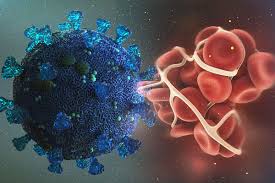NEWS RELEASE : Urgent Call to Action on WHO in Relation to COVID-19-Related VTE
 Ad Adams Ebenezer is a co-founder of the Stroke Association Supportnetwork (SASNET) Ghana. He is also a board of director of the World Stroke Organization.
Ad Adams Ebenezer is a co-founder of the Stroke Association Supportnetwork (SASNET) Ghana. He is also a board of director of the World Stroke Organization.
Adams has been actively involved in the testing and launching of the Post Discharge Stroke Support (PDSS) around the world, collaborating with teams from South Africa and the United States.
A SYSTEMATIC APPROACH FOR MANAGING VENOUS THROMBOEMBOLISM IN PATIENTS WITH COVID-19

A Systematic Approach for Managing Venous Thromboembolism in Patients with COVID-19: A Multinational Consensus Statement from the International Society on Thrombosis and Haemostasis (ISTH) on Behalf of the International Thrombosis Community
Introduction
With more than 6.7 million confirmed cases worldwide[i] and nearly 400,000 deaths to date (7th June 2020) during 2020,[ii] the COVID-19 pandemic is one of the most significant healthcare crises of our time. The spread of COVID-19 has been varied, with some regions having sporadic transmission and relatively few hospitalized patients with COVID-19 pneumonia, and others where significant transmission has overwhelmed health services. While the disruption to health services continues, it is vital for the World Health Organization (WHO) to share the lessons of how best to prevent, diagnose, and treat patients with COVID-19 with health systems globally, and to learn about agreed clinical best practice approaches, which may improve patient outcomes.
The WHO should be congratulated on the publication of interim guidance on the Clinical Management of hospitalized patients with COVID-19[iii], the second iteration of which was published by the WHO in late May, which serves as a useful first step resource for health systems internationally. However, more must be done to meet the needs of front-line clinicians caring for patients with COVID-19 to ensure quality care, by addressing significant gaps in expert clinical guidance surrounding the prevention and management of venous thromboembolism (VTE) in COVID-19 patients.

COVID-19 and Venous Thromboembolism (VTE)
Venous thromboembolism (VTE) is a condition in which a blood clot forms most often in the deep veins of the leg, groin or arm (known as deep vein thrombosis , DVT) and travels in the circulation, lodging in the lungs (known as pulmonary embolism, PE). Together, DVT and PE are known as VTE – a dangerous, potentially deadly, medical condition.[iv] Hospital-associated VTE (describes VTE occurring in hospital and 90 days post discharge) accounts for 60% of all VTE.
Emerging research indicates that:
- People with COVID-19, especially those hospitalized with the moderate (requiring supplementary oxygenation) and severe (requiring mechanical ventilation) COVID-19 pneumonia have a high incidence of VTE[v]
- COVID-19 pneumonia is associated with a marked hypercoagulability, including high levels of fibrinogen and very high D-dimer levels;
- In patients with COVID-19 pneumonia, there is a major inflammatory response which can lead to micro-clots – immunothrombosis – within the lungs. This likely contributes to the high levels of mortality seen in patients with COVID-19 pneumonia;
- Some countries are facing difficulties in accessing low molecular weight heparins (blood thinners), a WHO essential medicine, that is a vital prophylactic and treatment for VTE in hospitalized patients with COVID-19.
Call to Action on WHO in Relation to COVID-19-Related VTE
To reduce harm from COVID-19 associated VTE, the International Society on Thrombosis and Haemostasis, together with the undersigned national, continental and international clinical representative organizations, urgently calls on the WHO to endorse and share the application of a system-wide approach to VTE management on a global scale, as part of the international COVID-19 response that seeks to:

- Highlight the importance of a systematic approach to VTE prevention, diagnosis and treatment for patients with COVID-19; including those isolating at home, those hospitalized and those post discharge;
- Meet the needs of front-line clinicians caring for patients with COVID-19 to ensure quality care by improving health worker education about VTE in COVID-19 management that incorporates up-to-date consensus recommendations in the next iterations of WHO interim guidance on the Clinical Management of COVID-19 (ensuring a VTE expert(s) is enlisted to the Guideline Development Group);
- Signpost hospitals to accredited up-to-date evidence based clinical information portals on VTE related COVID-19 clinical guidance, such as the ISTH COVID-19 Resource Page;
- Highlight to member states the importance of making available all WHO Essential Medicines, in particular low molecular weight heparins (blood thinners), which provides vital prophylactic and treatment for VTE;
- Improve COVID-19 VTE data collection and research to support regular updates of evidence-based clinical recommendations; and
- Encourage the implementation of a global VTE risk assessment tool for hospitalized patients.
VTE not only can kill, but can also have devastating co-morbidities, which significantly impact the quality of life for patients who survive COVID-19 and an associated VTE[vi] .
Until there is a vaccine for COVID-19, there is no better way to address this public health challenge than for the WHO to prioritize the development of systematic and integrated approaches to COVID-19-related VTE prevention that can be implemented in secondary and tertiary settings globally.
We urge the WHO to act now and offer our collective resources and expertise to assist in such an endeavor.
Link to ISTH and 70 organizations around the world that have signed the Consensus statement
Website: https://www.isth.org/news/517212
Signed on behalf of ISTH
Claire McLintock ( President) Jeffrey Weitz (President -Elect) Beverley Hunt, O.B.E.(Chair, World Thrombosis Day)
REFERENCES
[i] https://www.who.int/docs/default-source/coronaviruse/situation-reports/20200527-covid-19-sitrep-128.pdf?sfvrsn=11720c0a_2
[ii] Ibid
[iii] https://www.who.int/publications-detail/clinical-management-of-covid-19
[iv] www.worldthrombosisday.org/issue/vte/
[v] “Clinical Guidance on the Diagnosis, Prevention and Treatment of Venous Thromboembolism in Hospitalized Patients with COVID-19,” Journal of Thrombosis and Haemostasis (JTH).
[vi] Ibid


